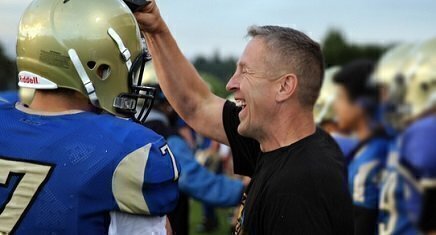A constitutional dispute over public prayer between a high school football coach and his school district near Seattle has drawn in members of Congress, Satanists and attorneys, and it could be heading to court.

So what happens when a public school football coach leads a voluntary prayer on a football field after a game concludes, and a crowd joins in? In the case of Bremerton High School assistant coach Joe Kennedy, he recently received official notice from school district officials to stop praying on the field in public after games.
Before the Bremerton Knights’ final home game tonight, the school district put Kennedy on paid administrative leave.
“While the district appreciates Kennedy’s many positive contributions to the BHS football program, and therefore regrets the necessity of this action, Kennedy’s conduct poses a genuine risk that the District will be liable for violating the federal and state constitutional rights of students or others. For this reason, Kennedy will not be allowed to further violate the District’s directives,” the district said in a statement late Wednesday night.
Kennedy's lawyers plan to file discrimination charges with the Equal Employment Opportunity Commission.
The controversy involves two core constitutional concepts about religion: the Establishment and Free Exercise Clauses of the First Amendment. Under the Establishment Clause, governments and their agencies, such as public schools, can’t endorse religious practices through their actions. But individual expressions of religious beliefs at public schools, under certain circumstances, are protected by the Free Exercise Clause.
Interactive Constitution Explanations: Establishment Clause | Free Exercise Clause
Kennedy has been praying after games for about seven years, according to local media reports, but it was also only recently that his activities were noticed beyond Bremerton. An official decision from the Bremerton School District on October 15 started Kennedy’s story on a path to becoming a national story.
“When we were informed last month about the religious practices on the football field, we looked into the matter and were pleased to determine that the BHS football coaching staff’s conduct was entirely well‐intentioned. The coach in question did not understand he was violating federal law. Once he was informed of the law, he agreed to abide by the federal guidelines – guidelines that respect the constitutional rights of our employees and our students. I expect and hope that our coach will keep his commitment,” the District said.
However, Coach Kennedy reconsidered his decision after speaking with The Liberty Institute, a Texas-based legal organization.
“No reasonable observer could conclude that a football coach who waits until the game is over and the players have left the field and then walks to mid-field to say a short, private, personal prayer is speaking on behalf of the state. Quite the opposite, Coach Kennedy is engaged in private religious expression upon which the state may not infringe,” the Liberty Institute said in a letter to the district.
On the following day, Kennedy was joined by a crowd at his usual post-game prayer after a homecoming game loss. The crowd included folks from Bremerton’s homecoming rival team.
Last Friday, Washington State Superintendent of Public Instruction Randy Dorn said his agency was behind the Bremerton School District. “School officials are role models; leading a prayer might put a student in an awkward position, even if the prayer is voluntary,” Dorn said. “What’s more, that official could open the district up to a lawsuit.”
After Dorn’s statement was issued, at least one lawsuit appeared to be on the way – from the Liberty Institute.
On October 26, the Liberty Institute said in a statement it would initiate legal proceedings against the Bremerton School District “for violating Coach Kennedy’s rights under Title VII of the Civil Rights Act by refusing to honor his reasonable request for religious accommodation.”
Kennedy had received a letter from the school district on October 23, stating that he faced discipline, including the loss of his job, if he performed “demonstrative religious activity” while on the public field as a coach. The district did offer Kennedy a private location to pray near the football field.
At that point, two unlikely actors entered the scene. The 47 members of the Congressional Prayer Caucus in Washington, D.C., sent a public letter to the school district.
The Prayer Caucus referenced Supreme Court precedents that allow for “the voluntary observance of a brief prayer at the beginning of a legislative session — a tradition that is also embraced by both the United States Senate and House of Representatives.”
However, at the same time, the Satanic Temple of Seattle announced that it wanted to attend the next football game at Bremerton High School and hold its own Satanic prayer on the field after it was asked by a student to attend the team’s next game.
The Bremerton Knights play later tonight at 7 p.m. PDT on their home field against Sequim High School. It remains to be seen who attends the game. The district said there was no restriction on Kennedy attending the game in the stands, and it is unknown if the the Satanic Temple members also will be stands.
But the Seattle Times reported that Kennedy reached out to the Satanists to express his support for their constitutional stance.
Scott Bomboy is the editor in chief of the National Constitution Center.







